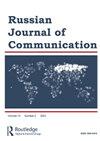后知识分子时代和二十一世纪的俄国灾难
Q1 Social Sciences
引用次数: 1
摘要
我已经有机会注意到俄罗斯的专制政权是如何相互取代的(Piontkovsky, 2009)。不是一些永恒的打击,也不是反对派的一次大胆的突袭,导致了政府的垮台。相反,这个政权突然崩溃,原因是一种奇怪的不适,对自身存在的厌恶(萨特的la naussame),这种厌恶目前正困扰着普京政权。显然,尽管他的体制已经成功地覆盖了俄罗斯的整个政治版图,但它已经陷入了困境。如果说后共产主义时代的几十年取得了如此糟糕的结果,这在很大程度上要归功于知识分子,或者其代表如今更愿意称自己为“知识分子”。后者背叛了安德烈·萨哈罗夫的理想。在20世纪90年代,那些自称改革家的人对奥古斯托•皮诺切特(Augusto Pinochet)表现出更多的尊敬,而不是萨哈罗夫最看重的政治道德原则。俄罗斯的“体制自由主义者”要为普京和他的克格勃暴徒掌权和培育“强盗资本主义”承担责任,这种资本主义现在正把这个国家推向去现代化的道路。对萨哈罗夫来说,民主是相互竞争的政治力量之间的一场诚实的选举竞赛。对于俄罗斯的“体制自由主义者”来说,这是一个允许“民主人士”以任何可能的手段维护权力和财富的体制。安德烈·德米特里耶维奇·萨哈罗夫(Andrei Dmitrievich Sakharov)会对这种说法感到愤怒,即人民是无知的绵羊,等待着被自称为“进步思想家”的人引向更好的生活。俄罗斯政治阶层确信,只有10-15%的俄罗斯人准备好了现代化,如果没有“开明”的领导层,这个国家将会灭亡。俄罗斯的后知识分子阶层在其成员掌权或被当局聘用时,就背弃了萨哈罗夫的遗产。在这个过程中,他们在道德和思想上自杀了。如果把知识分子关于俄罗斯人民对民主毫无准备的落后的说法,视为克里姆林宫的谈话要点,那就错了。相反,我们应该在这句口头语中看到,这是一种绝望的尝试,试图挽救自尊,并为知识分子对同胞的背叛找借口。由于无法翻译成其他语言,“知识分子”这个词代表了一种特殊的俄罗斯现象,一个无定形的社会小群体,作为一个小群体而蓬勃发展本文章由计算机程序翻译,如有差异,请以英文原文为准。
The post-intelligentsia and the Russian catastrophe of the twenty-first century
I’ve already had an occasion to note how authoritarian regimes in Russia replace each other (Piontkovsky, 2009). It isn’t some eternal blow or a daring foray by the opponents that brings down the government. Instead, the regime collapses suddenly from a strange malaise, existential disgust with itself (Sartre’s la nausée), the kind that currently plagues Putin’s regime. Clearly, his system is ailing, even though it has successfully paved over the entire political landscape in Russia. If the post-Communist decades have yielded such paultry results, it is in large measure because of the intelligentsia, or as its representatives prefer to call themselves these days – ‘intellectuals.’ The latter have betrayed the ideals of Andrei Sakharov. In the 1990s, the selfproclaimed reformers showed more reverence to Augusto Pinochet than to the principle Sakharov valued the most –morality in politics. Russia’s ‘systemic liberals’ bear the responsibility for bringing Putin and his KGB thugs to power and fostering the ‘bandit capitalism’ that is now pushing the country down the path of demodernization. For Sakharov, democracy was an honest electoral contest between competing political forces. For Russian ‘systemic liberals,’ it is a system that allows ‘democrats’ to preserve power and wealth by any means possible. Andrei Dmitrievich Sakharov would have bristled at the idea that the people were ignorant sheep waiting to be led to a better life by self-proclaimed ‘progressive thinkers.’ The Russian political class is convinced that barely 10–15% of the Russian population is ready for modernization, and that without the ‘enlightened’ leadership the country would be lost. The Russian post-intelligentsia turned away from Sakharov’s legacy when its members assumed power or were hired by the authorities. In the process, they committed moral and ideological suicide. It would be a mistake to view the intelligentsia’s recitations about the backwardness of the Russian people unprepared for democracy as just Kremlin talking points. Rather, we should see in this mantra a desperate attempt to salvage self-respect and rationalize the betrayal of their countrymen by the intelligenty. Untranslatable into other languages, the word ‘intelligentsia’ signifies a peculiarly Russian phenomenon, an amorphous social mini-group that sprang to life as a by-
求助全文
通过发布文献求助,成功后即可免费获取论文全文。
去求助
来源期刊

Russian Journal of Communication
Social Sciences-Political Science and International Relations
自引率
0.00%
发文量
0
期刊介绍:
Russian Journal of Communication (RJC) is an international peer-reviewed academic publication devoted to studies of communication in, with, and about Russia and Russian-speaking communities around the world. RJC welcomes both humanistic and social scientific scholarly approaches to communication, which is broadly construed to include mediated information as well as face-to-face interactions. RJC seeks papers and book reviews on topics including philosophy of communication, traditional and new media, film, literature, rhetoric, journalism, information-communication technologies, cultural practices, organizational and group dynamics, interpersonal communication, communication in instructional contexts, advertising, public relations, political campaigns, legal proceedings, environmental and health matters, and communication policy.
 求助内容:
求助内容: 应助结果提醒方式:
应助结果提醒方式:


